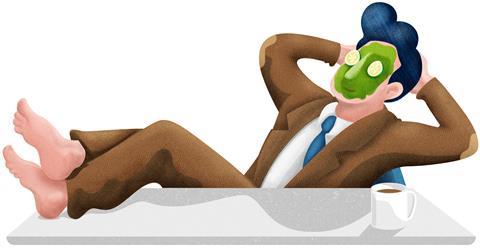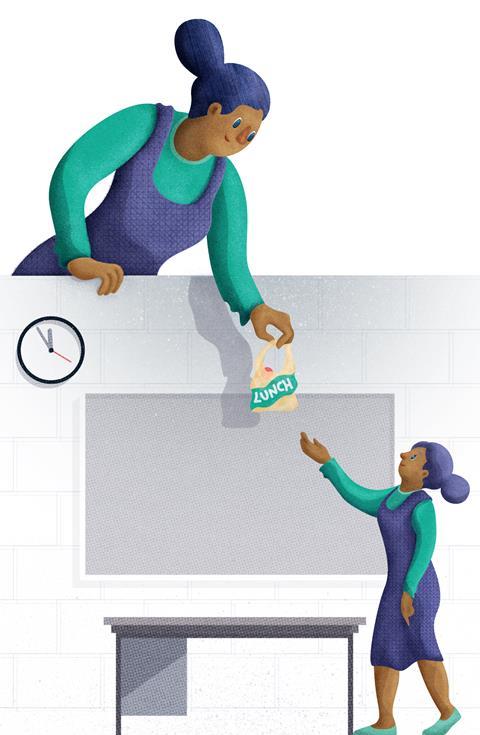What Andy Chandler-Grevatt wishes he had been told when he started teaching
About 12 years ago I arrived at school at about seven-thirty as usual. I was an advanced skills teacher, and regarded well by most teachers, students and parents. Something that day was different. I sat in my car until about eight, getting out did not seem an option; it was as if I were stuck. Normally I would be in my laboratory, planning, marking or getting my lessons ready. I was terrified; my legs wouldn’t move. By eight-thirty I was getting desperate. I knew I had to get out of my car, but I couldn’t. I texted my head of department. She came out to the car and told me I’d better go home. I was in my car for another thirty minutes, mind spinning. I decided to call my sister, who talked me round to driving home. I did, but it took several months for me to recover from this panic attack and return to work.
Stories like this are not unusual and they happen to competent, dedicated teachers. In hindsight, there were lots of reasons I reached this breaking point. Several reasons were external, but there were some things that I could have done to protect myself.

Now that I am involved with teacher training and supporting newly qualified teachers, I often share with them what I wish I’d been told when I started teaching. It’s called ‘self-care’, and it is something we are not usually taught about during training or while teaching. However, this is changing, and schools are becoming more aware of, and understanding about, mental health issues. Personally, I have to manage depression, anxiety and panic. Generally, I manage them well; however, sometimes these conditions start to become less manageable and I need to think more about self-care.
The following five tips may help to protect you from developing mental health issues and should make you a happier, healthier, more productive teacher.
1. Meet your basic needs
Everyone needs to eat, drink and go to the toilet during a working day. Teachers often deny themselves these basic needs because of the demands of students or other colleagues. Skipping a tea break or a lunch break occasionally may be unavoidable, but on the whole teachers should take time to have breaks during the day. If your lunch break is an hour long, make sure you sit and eat for at least half of it. If you are on duty, make sure you have non-contact time before or after that break so that you can eat, drink and use the toilet. I know of teachers who developed kidney infections because they hadn’t drunk enough or used the toilet during the day.
Outside work, your main basic need is to get enough sleep. The exact requirement differs from person to person, but in general we need 8 hours of quality sleep for good health and productive functioning. Teaching is a tiring job, emotionally as well as physically. Healthy sleep routines are important for you to recharge for the next full-on day. Have a cut-off time each evening where you stop work, unwind, go to bed and sleep. Working into the early hours will not make you productive the next day.
2. Have clear goals and a default plan
At the start of an academic year, identify the main things you want to achieve in that time. For example, if you are a new teacher, your main focus should be to pass your probation year. If you are an experienced teacher, it may be to improve a particular area of practice or focus on a particular class. In addition, have a personal goal, unrelated to school. That goal could be pursuing a hobby or spending more time with family and friends. Write these goals down somewhere, perhaps in your planner. These will help you make decisions later.

Having worked out what your main goals are, develop a default plan for a typical week. Plan when you will carry out your main responsibilities: lesson planning, teaching, marking. Around that, decide when you will eat meals, sleep, travel, exercise. If you have children, include in the plan the time you need for their care as well as family time. Make sure you have ‘you’ time planned. If you can, make space one evening a week for a hobby, ideally one you must leave the house for, for example a book club, a drawing class, a team sport, a choir. Friday nights for me are always ‘date night’, time to go out for a meal, or to the cinema. These details are important: if you don’t plan for them, you won’t do them. Another consideration is planning not to work at weekends; this may mean you have to work a bit longer each day at school, but make a decision that works for you.
The Association for Science Education 11–19 Committee has produced a document that supports teachers who are considering leaving the profession. There is an exercise in this downloadable booklet that helps you reflect on, and manage, your work–life balance: ase.org.uk/sos.
The Association for Science Education 11–19 Committee has produced a document that supports teachers who are considering leaving the profession. There is an exercise in this downloadable booklet that helps you reflect on, and manage, your work–life balance.
3. Protect boundaries and learn to say ‘no’
Having worked out your goals and your default plan, you can use these as boundaries to help you make decisions. Schools are unpredictable places, so you need to be flexible about unforeseen events. Students may have emergencies that need immediate attention, other staff may need your support, the photocopier may break down. However, you need to make professional decisions.
Saying ‘no’ is one of the more challenging skills in maintaining self-care. As professionals we want to be helpful, we are keen to take on new challenges, but we do need to be mindful of the short-term and long-term impact of taking on something extra. If you are asked to do something outside your default plan, decide if it is something you can do while protecting your work-life balance. If necessary say that you can’t give it the time it needs.
4. Don’t compare yourself to others
Armed with your goals and boundaries, you know you have planned reasonable time to do a good job and also have a life. You will see colleagues arrive at the crack of dawn, leave last and participate in many initiatives. There are also the ‘martyrs’ who believe that they have to suffer to be a good teacher and will overlook their own self-care. They may try to put these expectations on you. Be secure in your goals, default plan and work–life balance and hold firm, as you will be happier, healthier and a better teacher. Maybe even slip a copy of this article in your colleagues’ pigeonholes!
5. Be kind to yourself

Teachers are often their own worst critics. We can put unreasonable expectations on ourselves. Treat yourself with the compassion you would give a colleague or a student you teach. When you feel overwhelmed, look at your default plan and reflect on what has changed. Make changes to get back on track. If you can’t see a way forward ask a colleague for help; we are not expected to work in isolation.
When you are over-tired, reduce your planning or marking and get to bed early. When you are fed up with work, do something that gives you joy: go for a walk, watch a film, have a relaxing bath or spend quality time with your family.
Self-care is about taking responsibility for your own health, but your employer also has a duty of care. If things get tough, talk to your line manager, armed with your goals and default plan. Find a way forward in the short term and the long term.
We are always learning how to manage our time, but I hope these suggestions give you a better chance of staying healthy and enjoying your job.















1 Reader's comment